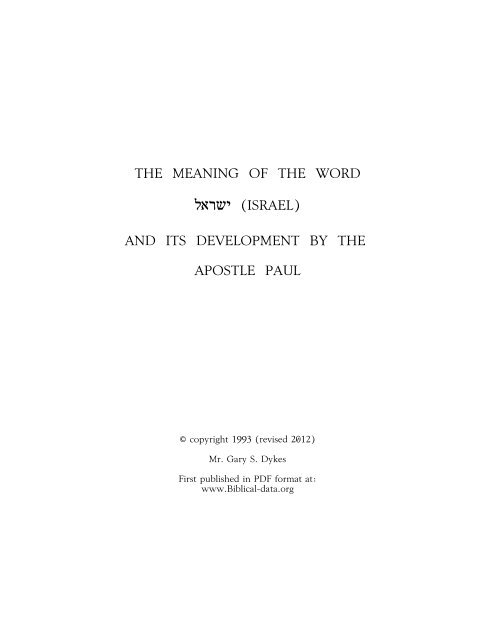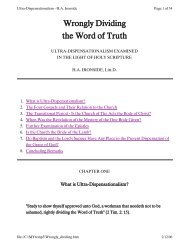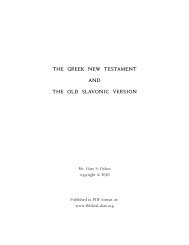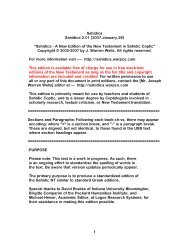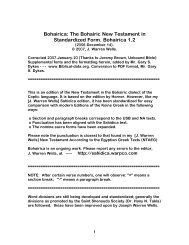The Meaning of the Word "ISRAEL" and Its ... - Biblical-data.org
The Meaning of the Word "ISRAEL" and Its ... - Biblical-data.org
The Meaning of the Word "ISRAEL" and Its ... - Biblical-data.org
You also want an ePaper? Increase the reach of your titles
YUMPU automatically turns print PDFs into web optimized ePapers that Google loves.
THE MEANING OF THE WORD<br />
(ISRAEL)<br />
AND ITS DEVELOPMENT BY THE<br />
APOSTLE PAUL<br />
© copyright 1993 (revised 2012)<br />
Mr. Gary S. Dykes<br />
First published in PDF format at:<br />
www.<strong>Biblical</strong>-<strong>data</strong>.<strong>org</strong>
How an individual defines <strong>the</strong> Hebrew word for êIsraelê can actually serve as an<br />
indicator for many <strong>of</strong> his or her's <strong>the</strong>ological positions. This proposition loses some <strong>of</strong><br />
its validity when we observe that usage which a naïve person may employ, such a person<br />
may simply be mimicking <strong>the</strong> usage <strong>of</strong> <strong>the</strong> term by his/her peers, <strong>and</strong> hence have<br />
no actual <strong>the</strong>ological import as concerns <strong>the</strong>ir own <strong>the</strong>ology. When a mature saint <strong>and</strong><br />
student <strong>of</strong> <strong>the</strong> Scriptures is observed (as to <strong>the</strong>ir definition <strong>of</strong> <strong>the</strong> term êIsraelê), we<br />
may <strong>the</strong>n begin to assay <strong>the</strong>ir <strong>the</strong>ological presumptions. This brief paper is aimed at<br />
both types <strong>of</strong> individuals¯those who actually know what <strong>the</strong>y mean when <strong>the</strong>y use<br />
<strong>the</strong> term êIsraelê, <strong>and</strong> those who have not yet examined <strong>the</strong> term on <strong>the</strong>ir own so as<br />
to be able to confidently define <strong>the</strong> word.<br />
Much has been written upon this Hebrew word, which fully pointed is -<br />
<strong>and</strong> is transliterated in Greek as æsrahl. Arguments <strong>of</strong>ten stem from a historical<br />
examination <strong>of</strong> <strong>the</strong> word in an etymological sense, especially since Northwest<br />
Semitic studies have bloomed. A fine example <strong>of</strong> a treatment <strong>of</strong> <strong>the</strong> term from a historical-linguistics<br />
perspective is seen in W. F. Albrightës paper in volume 46 <strong>of</strong> <strong>the</strong><br />
1927 Journal <strong>of</strong> <strong>Biblical</strong> Literature. Much can be said for this method <strong>of</strong> explaining <strong>the</strong><br />
semantics <strong>of</strong> <strong>the</strong> Hebrew term, yet no conclusive definition can be dogmatically asserted.<br />
This is due to <strong>the</strong> confluence <strong>of</strong> ancient languages in <strong>the</strong> time <strong>of</strong> Jacob; <strong>and</strong> from a<br />
historical perspective, too many various nuances present <strong>the</strong>mselves to <strong>the</strong> observer for<br />
<strong>the</strong> matter to be settled, not to mention <strong>the</strong> question which concerns <strong>the</strong> pointing <strong>of</strong><br />
<strong>the</strong> original Hebrew terms.<br />
An ancillary method, is to define <strong>the</strong> term via its various contexts, which also produces<br />
a plethora <strong>of</strong> possibilities, each displaying a connotated shift in accordance with<br />
whichever context <strong>the</strong> term is viewed. A fine example <strong>of</strong> this type <strong>of</strong> examination <strong>of</strong><br />
<strong>the</strong> term is seen in <strong>the</strong> Supplementary Issue <strong>of</strong> <strong>The</strong> Princeton Seminary Bulletin, 1990, in<br />
articles by Otfried H<strong>of</strong>us, <strong>and</strong> J. Christiaan Beker et cetera. Ano<strong>the</strong>r example <strong>of</strong> this<br />
contextual method is seen in <strong>the</strong> December 1978 issue <strong>of</strong> <strong>the</strong> Journal <strong>of</strong> <strong>the</strong> Evangelical<br />
<strong>The</strong>ological Society, in an article by Charles M. Horne <strong>of</strong> Wheaton College Graduate<br />
2
School. Such essays as <strong>the</strong>se samples, would have benefited greatly if an etymological<br />
approach was also employed along with <strong>the</strong> <strong>the</strong>ological/contextual one. However<br />
each essay <strong>of</strong> each type generates some value, <strong>and</strong> is useful for <strong>the</strong> researcher who endeavors<br />
to underst<strong>and</strong> <strong>the</strong> term - .<br />
In this paper an attempt will be made to illustrate that singular monosemic meaning<br />
which is inherent in all <strong>the</strong> usages <strong>of</strong> our term êIsraelê. When this meaning is established,<br />
students should start with this essential definition, <strong>and</strong> <strong>the</strong>n add <strong>the</strong> additional<br />
connotations which a context may supply. By observing this unique monosemic<br />
meaning some insight can be gained, <strong>and</strong> some arguments resolved.<br />
Underst<strong>and</strong>ing <strong>the</strong> essential meaning <strong>of</strong> our word êIsraelê is important because it<br />
underlies <strong>and</strong> serves as a nucleus for larger <strong>the</strong>ological perspectives, how one underst<strong>and</strong>s<br />
Godës <strong>Word</strong> <strong>and</strong> how His <strong>Word</strong> relates to us today. To ascertain <strong>the</strong> essential<br />
meaning we shall briefly note some basic dictionary <strong>and</strong> historical definitions, <strong>and</strong><br />
<strong>the</strong>n couple <strong>the</strong>se with popular perceptions which stem from certain biblical contexts.<br />
One <strong>of</strong> <strong>the</strong> earliest occurrences <strong>of</strong> our word in a Semitic language is seen near <strong>the</strong><br />
bottom <strong>of</strong> <strong>the</strong> famous Merenptah inscription in hieroglyphics. Ge<strong>org</strong>e A. Barton (Archaeology<br />
<strong>and</strong> <strong>the</strong> Bible - page 376) shows <strong>the</strong> reign <strong>of</strong> this Egyptian Pharaoh<br />
[Merenptah] as from 1225-1215 B.C.. In <strong>the</strong> Armana documents circa 14 th century<br />
B.C., we encounter a disputed term which probably means êHebrewsê who were <strong>the</strong>n<br />
upsetting various Palestinian kings with <strong>the</strong>ir presence in Canaan. In <strong>the</strong> Botterweck/<br />
Ringgren definition (<strong>The</strong>ological Dictionary <strong>of</strong> <strong>the</strong> Old Testament - page 399, volume<br />
VI), we note <strong>the</strong> ancient use <strong>of</strong> <strong>the</strong> word êIsraelê as a name <strong>of</strong> a family or person in a<br />
Ugaritic text, <strong>and</strong> is perhaps seen in several ostraca from Samaria.<br />
<strong>The</strong> term should be old. In fact it seems like an expected name for various ancient<br />
persons as it is a compound <strong>of</strong> two ancient Semitic words:<br />
GOD - , <strong>and</strong> RULE, POWER or MAINTAIN - <br />
3
However, <strong>the</strong> above definition for <strong>the</strong> prefix - is hotly disputed, <strong>and</strong> once it<br />
is resolved no consensus can be expected. êElê or êG(g)od []ê is a common ancient<br />
Canaanite term for God, a lord or master <strong>and</strong> is also used as such in <strong>the</strong> Hebrew<br />
Bible, its meaning is clear <strong>and</strong> well established.<br />
In this paper, <strong>the</strong> prefix êyshar- []ê is seen as a verb form <strong>of</strong> <strong>the</strong> Hebrew. And<br />
as Eberhard Nestle pointed out (as seen in Albrightës essay - page 159), ê<strong>the</strong> divine<br />
element in <strong>the</strong>ophorous names is always subject, <strong>and</strong> never <strong>the</strong> object.ê Some exceptions<br />
are noted, but following this dictum we would not translate êIsra-Elê as: êstruggling<br />
against (or, with) Godê, but ra<strong>the</strong>r as êGod fightersê or êGod perseverersê.<br />
Viewing êGodê as <strong>the</strong> subject <strong>of</strong> <strong>the</strong> verb êIsra- ê. For example êPeni-Elê <strong>of</strong> Genesis<br />
32:30 would be translated as êGod facesê or, êface <strong>of</strong> Godê (stemming from <strong>the</strong> Hebrew<br />
verb - êin <strong>the</strong> presence <strong>of</strong>ê), but not êface toward Godê.<br />
<strong>The</strong> verbal prefix is sometimes rendered as êstraightê or, êuprightnessê, or typically<br />
as a form <strong>of</strong> <strong>the</strong> verb (êsharê or êsarahê) which can <strong>the</strong>n generate <strong>the</strong>se meanings:<br />
êruleê, êprotectê or êpowerê as above; <strong>and</strong> if correlated with <strong>the</strong> Arabic<br />
êshariyaê can mean êto persistê. As Ralph Marcus pointed out (Journal <strong>of</strong> <strong>Biblical</strong> Literature<br />
- page 150, June 1941, volume LX), it is difficult to arrive at a precise specific<br />
meaning from all <strong>of</strong> <strong>the</strong> ancient usages, however Albrightës êhealê is well argued. In<br />
fact here is a brief list <strong>of</strong> <strong>the</strong> definitions given to <strong>the</strong> term by a variety <strong>of</strong> <strong>Biblical</strong><br />
scholars in <strong>the</strong>ir works:<br />
C. I. Sc<strong>of</strong>ield - prince with power S. R. Driver - perseverer with God<br />
A. H. Sayce - to be upright Adam Clarke - a prince <strong>of</strong> God<br />
William Gesenius - soldier <strong>of</strong> God<br />
John Skinner - Striver with God<br />
E. B. Pusey - He is a prince with God Rol<strong>and</strong> E. Murphy - God rules<br />
W. F. Albright - God heals J. H. Kurtz - Prince <strong>of</strong> God<br />
C. F. Keil - Godës fighter A. Gosman - <strong>the</strong> captain <strong>of</strong> God<br />
4
Hence, we note quite a diversity. As a consequence we look for ano<strong>the</strong>r or additional<br />
way in which to determine <strong>the</strong> singular specific meaning, we look to <strong>the</strong> context(s).<br />
<strong>The</strong> above definitions are all connected with one passage, that <strong>of</strong> Genesis<br />
32:28 wherein <strong>the</strong> angel gave to Jacob this new name, <strong>and</strong> indeed even defines <strong>the</strong><br />
reason why. In <strong>the</strong> text <strong>of</strong> Genesis, <strong>the</strong> 1901 American St<strong>and</strong>ard Version correctly<br />
notes that <strong>the</strong> angelës definition can be rendered in two ways (again depending upon<br />
oneës view <strong>of</strong> <strong>the</strong> relevant verb!), as êstriven with Godê (<strong>the</strong> ASV text) or as êhad<br />
power withê (<strong>the</strong> ASV footnote). O<strong>the</strong>r versions render it thusly:<br />
as a prince, thou hast power with God - KJV<br />
for you have striven with God - NASB<br />
for thou hast been strong against God - Douay Version<br />
for you have striven with God <strong>and</strong> humans - NRSV<br />
<strong>The</strong> ambiguous phrases¯ê...with Godê seem intentional. <strong>The</strong>y can mean against<br />
God, or empowered by God. In deciding, let us pose this question; êdid Jacob fight<br />
against Godê or êwith Godê?<br />
When Jacob êwrestledê with <strong>the</strong> angel (a <strong>the</strong>o-angelic form <strong>of</strong> God), his êfightingê<br />
was more <strong>of</strong> a êstruggleê even a êclingingê, <strong>the</strong> only force exerted was demonstrated<br />
in his not letting go. God, <strong>the</strong> angel, allowed Jacob to prevail, <strong>and</strong> did not exert His<br />
power against Jacob. A reminder <strong>of</strong> Who actually is in power was given to Israel<br />
(Jacob) with <strong>the</strong> nerve damage in his hip. Jacob persevered only because God allowed<br />
him to.<br />
Fur<strong>the</strong>r, we note that it is God Who actually fights FOR Israel, as seen in Joshua<br />
10:14,42 <strong>and</strong> at Isaiah 38:4 et cetera. In effect, Jacob was encouraged clinging to this<br />
angel, he needed encouragement, as he was about to cross over <strong>and</strong> face his bro<strong>the</strong>r<br />
Esau. In Genesis 32:28 our verb portion <strong>of</strong> êIsra-elê is a ra<strong>the</strong>r rare Hebrew verb signifying<br />
êpowerê (), <strong>the</strong> actual verb is also seen in this verse <strong>and</strong> is used one<br />
o<strong>the</strong>r time at Hosea 12:3 <strong>of</strong> Jacob <strong>and</strong> Esau in <strong>the</strong> womb. Again Jacob clings, hanging<br />
on, not actually êwrestlingê but exerting unusual power. In Genesis 32:24 we do find<br />
5
a verb meaning êto wrestleê but it probably aligns with <strong>the</strong> Hebrew word for êJabbokê,<br />
not <strong>the</strong> term êIsraelê. [as noted in Albrightës essay, page 160].<br />
From <strong>the</strong> period <strong>of</strong> Jacobës name change onward, we note that it is God Who<br />
fights for Israel, it is God Who actually maintains <strong>and</strong> empowers His people. It is God<br />
Who protects His people. When obedient, Israel basked in <strong>the</strong> protection <strong>of</strong> a powerful<br />
(almighty) God Who blessed <strong>and</strong> caused <strong>the</strong>m to persevere. In light <strong>of</strong> this larger<br />
context, this writer suggests that <strong>the</strong> primary meaning <strong>of</strong> êIsraelê is êperseverers <strong>of</strong><br />
Godê.<br />
In Genesis 32:28, <strong>the</strong> Hebrew prepositions , are both rendered with <strong>the</strong> Greek<br />
meta in <strong>the</strong> Septuagint translation. Conybeare <strong>and</strong> Stock (Grammar <strong>of</strong> Septuagint Greek,<br />
page 84) demonstrate that this reflects <strong>the</strong> actual Hebrew meaning <strong>of</strong> êin dealing<br />
withê, <strong>the</strong> Hebrew prepositions do not mean êagainstê, usually <strong>the</strong>y are rendered as<br />
êwithê. In <strong>the</strong>ir 1048 occurrences <strong>the</strong> Koehler <strong>and</strong> Baumgartner Hebrew dictionary<br />
(<strong>The</strong> Hebrew <strong>and</strong> Aramaic Lexicon <strong>of</strong> <strong>the</strong> Old Testament, volume 2, page 839f.) never<br />
shows <strong>the</strong> preposition meaning êagainstê. Thus, in Genesis 32:28 <strong>the</strong> thought is that<br />
Jacob prevailed êwithê God, not against Him.<br />
Additionally, <strong>the</strong> two Hebrew verbs with which we are concerned with in Genesis<br />
32:28, are perfect (¯striven or, showed power with); <strong>and</strong> an imperfect<br />
(- to prevail over), <strong>the</strong>se verbs are juxtaposed in various ways, <strong>and</strong> <strong>the</strong> latter<br />
one may not have a ê-ê preceding it, as noted in A Preliminary <strong>and</strong> Interim Report on<br />
<strong>the</strong> Hebrew Old Testament Text Project. Volume 1, page 49. In Kennicottës work [see bibliography]<br />
<strong>the</strong> second Hebrew verb is omitted in several medieval Hebrew texts. <strong>The</strong><br />
second verb may also be rendered as a future tense, indicating that Jacob [Israel]<br />
would in <strong>the</strong> future prevail over men [Esau <strong>and</strong> o<strong>the</strong>rs]. <strong>The</strong>se fine points revolve<br />
around Hebrew grammar, but <strong>the</strong> context(s) seem to support a future aspect in <strong>the</strong><br />
second verb form. <strong>The</strong> Latin Vulgate also renders <strong>the</strong> second verb as praevalebis,<br />
which is a future, active voice, indicative mood verb. <strong>The</strong> Syriac translation renders<br />
<strong>the</strong> second verb as ty3mtaw which is an Ethpeel verb form but in a perfect construction,<br />
it harmonizes with <strong>the</strong> first verb, which is also an Ethpeel, perfect, <strong>the</strong> important<br />
point to be noted in this Syriac rendering (Syriac being a Semitic language) is<br />
6
that both verbs reflect a passive nuance! That is¯Jacob is acted upon by God, Jacob is<br />
empowered by God! Such is <strong>the</strong> Syriac text.<br />
<strong>The</strong> Greek LXX text varies, as printed in Rahlfs edition, only one Greek verb (<strong>of</strong><br />
<strong>the</strong> two Hebrew verbs under discussion) is shown, which verb reflects (apparently)<br />
both Hebrew verbs, Rahlfs appears as such: [dunatoj, appears to be a êhanging nominativeê]<br />
Genesis 32:28 (29)<br />
εἶπεν δὲ αὐτῷ Οὐ κληθήσεται ἔτι τὸ ὄνομά σου Ιακωβ, ἀλλὰ Ισραηλ ἔσται τὸ ὄνομά σου,<br />
ὅτι ἐνίσχυσας μετὰ θεοῦ καὶ μετὰ ἀνθρώπων δυνατός.<br />
A number <strong>of</strong> LXX manuscripts add a future tense, middle voice verb [esh] after<br />
êmenê or êpowerê. <strong>The</strong> one verb <strong>of</strong> <strong>the</strong> Rahlfs edition is an aorist tense active voice<br />
verb. <strong>The</strong> LXX translators may herein display some confusion as regards <strong>the</strong>ir rendering<br />
<strong>of</strong> <strong>the</strong>se two original Hebrew verbs, one being a perfect, <strong>and</strong> <strong>the</strong> second an imperfect<br />
tense/aspect.<br />
We thus note how several early translations rendered <strong>the</strong>se Hebrew verbs <strong>and</strong><br />
prepositions, in so doing we have hopefully gained some insight in our attempt to underst<strong>and</strong><br />
just what <strong>the</strong> literal text <strong>and</strong> context is conveying to <strong>the</strong> reader in our day<br />
<strong>and</strong> in times past.<br />
Israel is also used in a variety <strong>of</strong> o<strong>the</strong>r contexts: as a title describing a people called<br />
Israel, or for <strong>the</strong> physical l<strong>and</strong> <strong>of</strong> <strong>the</strong> country <strong>of</strong> Israel, or for <strong>the</strong> 10 nor<strong>the</strong>rn tribes as<br />
distinguished from <strong>the</strong> two sou<strong>the</strong>rn tribes. It is also used in <strong>the</strong> New Testament for<br />
earthly peoples (believers <strong>and</strong> non-believers) <strong>and</strong> a heavenly (spiritual) group <strong>of</strong> believers<br />
[Hebrews 12:22, <strong>and</strong> Philippians 3:2,3]. Most <strong>of</strong> <strong>the</strong>se usages are self evident,<br />
but much <strong>the</strong>ological discussion revolves around <strong>the</strong> heavenly <strong>and</strong> earthly Israelites,<br />
<strong>and</strong> involves <strong>the</strong> church <strong>of</strong> this present dispensation. [do refer to <strong>the</strong> essay titled: ê<strong>The</strong><br />
Church Extraordinary!ê, seen on <strong>the</strong> website¯www.biblical-<strong>data</strong>.<strong>org</strong>.]<br />
7
For example, texts which depict Israel as <strong>the</strong> tribe descended from <strong>the</strong> Patriarch<br />
Jacob are:<br />
<strong>The</strong>refore come now, <strong>and</strong> I will send you to Pharaoh, so that you may bring My people, <strong>the</strong> sons <strong>of</strong><br />
Israel out <strong>of</strong> Egypt. Exodus 3:10 [NASB], this usage proliferates in <strong>the</strong> Old <strong>and</strong> New Testaments,<br />
note also Acts 2:36.<br />
Texts which illustrate Israel as <strong>the</strong> 10 nor<strong>the</strong>rn tribes:<br />
...êHave you seen what faithless Israel did? She went up on every high hill <strong>and</strong> under every green<br />
tree, <strong>and</strong> she was a harlot <strong>the</strong>re..<strong>and</strong> her treacherous sister Judah saw it.ê Jeremiah 3:6,7 [NASB]<br />
Texts which illustrate an earthly Israel:<br />
Behold Israel after <strong>the</strong> flesh.. I Corinthians 10:18a [KJV]<br />
For truly in this city<br />
<strong>the</strong>re were ga<strong>the</strong>red toge<strong>the</strong>r against Thy holy servant Jesus, whom Thou didst<br />
anoint, both Herod <strong>and</strong> Pontius Pilate, along with <strong>the</strong> Gentiles <strong>and</strong> <strong>the</strong> peoples <strong>of</strong> Israel. Acts 4:27<br />
[NASB]<br />
Texts which illustrate a heavenly Israel:<br />
But <strong>the</strong> Jerusalem above is free; she is our mo<strong>the</strong>r, Galatians 4:26 [NASB]<br />
And those who will align to this rule, peace <strong>and</strong> mercy be upon <strong>the</strong>m, that is - upon <strong>the</strong> Israel <strong>of</strong><br />
God.<br />
Galatians 6:16 from <strong>the</strong> Greek.<br />
(note <strong>the</strong> rendering <strong>of</strong> <strong>the</strong> third kai as one denoting <strong>the</strong> explicative mode, êthat isê.)<br />
8
Arminians, <strong>and</strong> <strong>the</strong> like, picture <strong>the</strong> Israel in Galatians 6:16, as <strong>the</strong> ênew peopleê<br />
<strong>of</strong> God. Notably Gordon D. Fee (note: <strong>The</strong> First Epistle to <strong>the</strong> Corinthians, page 444),<br />
<strong>and</strong> he, like most holiness peoples, takes this phrase one step fur<strong>the</strong>r as he <strong>the</strong>n declares<br />
that <strong>the</strong>se ênew peopleê <strong>of</strong> God are <strong>the</strong> true Israel <strong>and</strong> serve to fulfill êhis [sic,<br />
His] promises made to <strong>the</strong> fa<strong>the</strong>rs.ê This is <strong>the</strong> typical amillennial or Pentecostal view<br />
which does not treat <strong>the</strong> many passages <strong>of</strong> Scripture concerning <strong>the</strong> actual restoration<br />
<strong>of</strong> ancient Israel as literal.<br />
O<strong>the</strong>r non-literal interpretations view modern Israel (that is <strong>the</strong> Israel as found in<br />
<strong>the</strong> New Testament) as Europeans [Armstrongism], or as a mythological tribe called<br />
êNephitesê [Mormonism]. However, many scholars, who consistently view <strong>the</strong> Scriptures<br />
in <strong>the</strong>ir plain literal sense (which includes literal allegories, <strong>and</strong> figures et cetera)<br />
view <strong>the</strong> Israel as seen in Revelation as literal genealogical descendants <strong>of</strong> Israel, which<br />
would include proselytes.<br />
One <strong>of</strong> <strong>the</strong> consequences <strong>of</strong> accepting <strong>the</strong> literal recognition <strong>of</strong> <strong>the</strong> New Testament<br />
Israel as a restored nation (as <strong>of</strong>ten seen in <strong>the</strong> Old Testament prophecies, <strong>and</strong> in <strong>the</strong><br />
book <strong>of</strong> Revelation), is a <strong>the</strong>ological system <strong>of</strong>ten dubbed êdispensationalê. Dispensationalists<br />
include such scholars as: Sc<strong>of</strong>ield, Darby, Bullinger, OëHair, Lewis Chafer,<br />
Ge<strong>org</strong>e N. H. Peters, Charles Ryrie, William R. Newell, all <strong>of</strong> <strong>the</strong> Feinbergs, J. D.<br />
Pentecost, M. R. DeHann¯to name a few. <strong>The</strong> dispensational underst<strong>and</strong>ing st<strong>and</strong>s in<br />
stark contrast to <strong>the</strong> amillennial system championed by Arminius, <strong>and</strong> Charles Finney.<br />
Modern spiritualizers <strong>of</strong> <strong>the</strong> term êIsraelê include: Gordon D. Fee, J. Rodman<br />
Williams, Oswald Allis, Carl Henry, Clark Pinnock, Ge<strong>org</strong>e Eldon Ladd, Henry Barclay<br />
Swete, et al.<br />
Hopefully <strong>the</strong> reader can now see that how one interprets <strong>the</strong> meaning <strong>of</strong> êIsraelê<br />
can be a major part <strong>of</strong>, <strong>and</strong> indicator <strong>of</strong> <strong>the</strong>ir respective <strong>the</strong>ological stance. Genesis<br />
32:28 defines <strong>the</strong> basic term for us. Yet some linguistic difficulties arise as <strong>the</strong> words<br />
in <strong>the</strong> context (32:22-32) can be pointed in various ways <strong>and</strong> hence alter <strong>the</strong> semantics.<br />
In turning to <strong>the</strong> New Testament, after <strong>the</strong> destruction <strong>of</strong> Jerusalem [A.D. 70]<br />
<strong>and</strong> in <strong>the</strong> later portions <strong>of</strong> <strong>the</strong> New Testament (notably <strong>the</strong> Revelation), <strong>the</strong> reader<br />
will meet again with a people/nation called êIsraelê. After <strong>the</strong> êraptureê [arpazw] <strong>of</strong><br />
9
<strong>the</strong> heavenly body members <strong>of</strong> Christ, <strong>the</strong> Israelites are ga<strong>the</strong>red from many nations<br />
into <strong>the</strong>ir l<strong>and</strong> (Israel) to experience a êtime <strong>of</strong> Jacobës troubleê. This <strong>of</strong>t prophesied<br />
event shows literal Israelites, descendants <strong>and</strong> proselytes to Judaism returning to a<br />
l<strong>and</strong> called êIsraelê. Some <strong>of</strong> <strong>the</strong>se rega<strong>the</strong>red Israelites, will convert to êMessianic<br />
Christianityê, via <strong>the</strong> Kingdom Gospel. <strong>The</strong>se new converts who are martyred or who<br />
live through <strong>the</strong> tribulation will receive <strong>the</strong>ir earthly inheritance, an inheritance which<br />
is <strong>the</strong> subject <strong>of</strong> many <strong>of</strong> <strong>the</strong> ancient <strong>Biblical</strong> writers <strong>and</strong> prophets. (Numbers 26:53,<br />
Jeremiah 3:18,19, Ezekiel 45:1) .<br />
<strong>The</strong> êrapturedê body members <strong>of</strong> <strong>the</strong> body <strong>of</strong> Christ, receive <strong>the</strong>ir heavenly inheritance,<br />
<strong>and</strong> are equipped with special spirit bodies, <strong>the</strong>ir inheritance is not <strong>the</strong> subject<br />
<strong>of</strong> <strong>the</strong> ancient <strong>Biblical</strong> prophets, at least not in most senses. <strong>The</strong> heavenly body members<br />
<strong>and</strong> <strong>the</strong> earthly body members <strong>of</strong> Christ will be united in <strong>the</strong> distant future,<br />
(Ephesians 1:10, <strong>and</strong> noting that êthingsê is not here a good translation <strong>of</strong> ta panta<br />
[I suggest êall humansê]). Thus, <strong>the</strong> body <strong>of</strong> Christ will be complete <strong>and</strong> manifest.<br />
<strong>The</strong> alert reader should now deduce that this writer correlates êIsraelê with <strong>the</strong><br />
êbody <strong>of</strong> Christê, with an important qualification. At this time, <strong>the</strong>re is not <strong>the</strong> actual<br />
union <strong>of</strong> <strong>the</strong> earthly <strong>and</strong> heavenly portions <strong>of</strong> <strong>the</strong> one body, temporary distinctions<br />
are in place. Earthly Israelites need to have <strong>the</strong>ir promises fulfilled: an earthly inheritance,<br />
an earthly 1,000 year millennial reign with <strong>the</strong>ir resurrected Messiah, being indwelt<br />
with <strong>the</strong> Holy Spirit, <strong>and</strong> <strong>the</strong>n inhabiting a new earth. Heavenly body members<br />
will fulfill/receive <strong>the</strong>ir promises: a rapture <strong>and</strong> translation, a heavenly awards ceremony,<br />
possessing eternal heavenly dwelling places, an inheritance in <strong>the</strong> light, et<br />
cetera. Thus, at this time, Israel has two aspects, <strong>the</strong> earthly <strong>and</strong> <strong>the</strong> heavenly, <strong>and</strong> at<br />
this time <strong>the</strong>y have distinct parameters as concerns <strong>the</strong>ir functions, worship <strong>and</strong> commissions.<br />
Though distinctions exist in this age, in which only <strong>the</strong> heavenly portion is<br />
being built, <strong>the</strong>re are numerous passages which demonstrate <strong>the</strong> actual unity <strong>of</strong> <strong>the</strong><br />
two groups. For instance compare <strong>the</strong>se two passages:<br />
10
GALATIANS 3:26 ISAIAH 1:1,2<br />
For you are all sons <strong>of</strong> God through<br />
<strong>The</strong> vision <strong>of</strong> Isaiah <strong>the</strong> son <strong>of</strong> Amoz concern<strong>the</strong><br />
faith <strong>of</strong> Jesus Christ<br />
ing Judah <strong>and</strong> Jerusalem¼ for <strong>the</strong> Lord speaks<br />
ëSons I have reared <strong>and</strong> brought up.ë<br />
If <strong>the</strong> physical descendants in <strong>the</strong> Isaiah quote are Godës sons, <strong>and</strong> if <strong>the</strong> Gentile<br />
saints in <strong>the</strong> Galatian quote are Godës sons, <strong>the</strong>n <strong>the</strong>y must be <strong>of</strong> <strong>the</strong> same family!<br />
Both types, <strong>the</strong> earthly portion, <strong>and</strong> <strong>the</strong> heavenly portion exist via <strong>the</strong> grace, care <strong>and</strong><br />
election <strong>of</strong> God. In <strong>the</strong> Romans epistle, Paul <strong>of</strong>ten argues that it is a selected remnant<br />
<strong>of</strong> Israel in general which will be saved. Not all genetic Israelites are <strong>of</strong> Israel!<br />
Israel is <strong>the</strong> people <strong>of</strong> God, <strong>and</strong> in various contexts, will contain both believers <strong>and</strong><br />
unbelievers. <strong>The</strong>y exist (especially <strong>the</strong> believers) because God has <strong>and</strong> is <strong>and</strong> will exert<br />
His power to preserve <strong>the</strong>m. <strong>The</strong>y persevere due to Godës care, despite Satanës power.<br />
At this time believing Israel is divided into two distinct sections, earthly <strong>and</strong> heavenly.<br />
Both sections are parts (members) <strong>of</strong> <strong>the</strong> one great Body <strong>of</strong> Christ, which body will<br />
be brought toge<strong>the</strong>r in all <strong>of</strong> its glory in Ephesians 1:10. At this present time, <strong>the</strong> distinctions<br />
are in place, <strong>and</strong> even throughout <strong>the</strong> Book <strong>of</strong> Revelation <strong>the</strong> heavenly portion<br />
<strong>of</strong> <strong>the</strong> Body <strong>of</strong> Christ is never mentioned or seen, (<strong>The</strong> heavenly city, <strong>the</strong> bride<br />
in Rev. 21, is <strong>the</strong> earthly nation <strong>of</strong> elected Israelites coming down from <strong>the</strong>ir temporary<br />
abode in heaven to <strong>the</strong>ir permanent abode, <strong>the</strong> new earth).<br />
<strong>The</strong> 12 apostles <strong>of</strong> Jesus Christ were/are sent to <strong>the</strong> earthly portion with a gospel<br />
<strong>of</strong> repentance <strong>and</strong> water baptism incorporating signs <strong>and</strong> miracles. <strong>The</strong> heavenly portion<br />
(which is now being built) is a group whose apostle is Paul, <strong>and</strong> who are baptized<br />
by (as opposed to êwithê) <strong>the</strong> Holy Spirit, no miracles or signs are normally<br />
manifested, our Lord is in heaven <strong>and</strong> we wait not for His return to earth, but ra<strong>the</strong>r<br />
for us to leave earth prior to His êcomingê (parousia) which coming accords to Jewish<br />
prophecy. Peter, James <strong>and</strong> John still are obedient to <strong>the</strong>ir commission¯to <strong>the</strong> people<br />
<strong>of</strong> Israel (earthly Israelites). Paul was (is) <strong>the</strong> apostle to <strong>the</strong> nations without genetic<br />
distinctions, which differs from our Lordës commission to <strong>the</strong> 12 (note Mat<strong>the</strong>w<br />
11
10:5,6 <strong>and</strong> Acts 2:22,36) which is to earthly genetic Israelites. <strong>The</strong>se are <strong>the</strong>n to go<br />
out <strong>and</strong> proselyte o<strong>the</strong>rs to <strong>the</strong> Messianic Church or kingdom. As per prophecy, <strong>the</strong>y<br />
are to begin with <strong>the</strong>ir own nation which could <strong>the</strong>n become a light unto <strong>the</strong> nations,<br />
[per Isaiah 60:1-3] only <strong>the</strong>ir nation, Israel, rejected <strong>the</strong> message, <strong>and</strong> <strong>the</strong>ir commission<br />
was (is) temporarily superseded by that <strong>of</strong> Paulës.<br />
Finally, it is Paul who distinguishes between an earthly <strong>and</strong> a heavenly Israel, none<br />
o<strong>the</strong>r <strong>of</strong> <strong>the</strong> inspired writers do so before Paulës revelations are manifested. Peter <strong>and</strong><br />
o<strong>the</strong>rs did later accept <strong>the</strong> revelations (<strong>of</strong>ten related to <strong>the</strong> êmysteryê) <strong>of</strong> Paul, as evidenced<br />
in II Peter. In presenting Israel as composed <strong>of</strong> elect <strong>and</strong> non-elect, <strong>and</strong> as<br />
heavenly <strong>and</strong> earthly, Paul advances our underst<strong>and</strong>ing <strong>of</strong> just what <strong>the</strong> total overall<br />
term êIsraelê means ¯it can mean:<br />
<strong>the</strong> physical l<strong>and</strong> <strong>of</strong> Israel<br />
any <strong>of</strong> <strong>the</strong> members <strong>of</strong> <strong>the</strong> 12 tribes<br />
<strong>the</strong> elected people <strong>of</strong> God (cumulatively since Adam)<br />
people who are maintained by God<br />
people, who will in <strong>the</strong> distant future be joined in some marvelous <strong>and</strong> mysterious<br />
way (a union <strong>of</strong> <strong>the</strong> earthly <strong>and</strong> heavenly).<br />
CONCLUSION<br />
How one interprets <strong>the</strong> word êIsraelê affects <strong>and</strong> indicates <strong>the</strong>ir <strong>the</strong>ological stance.<br />
It is a fine barometer for determining <strong>the</strong>ir overall underst<strong>and</strong>ing <strong>of</strong> <strong>the</strong> Scriptures.<br />
How one interprets êIsraelê can also declare how <strong>the</strong>y underst<strong>and</strong> many Scripture passages:<br />
as ei<strong>the</strong>r literal or non-literal. How one interprets êIsraelê usually agrees with<br />
<strong>the</strong>ir particular religious association¯Pentecostal, charismatic, Methodist (non-literal),<br />
or Baptist, Lu<strong>the</strong>ran, Dispensational, (literal).<br />
<strong>The</strong> term êIsraelê can be examined via historical linguistics, noting its translation or<br />
transliterations into various o<strong>the</strong>r languages such as Arabic, Syriac, Greek. <strong>The</strong>se linguistic<br />
observations can generate a variety <strong>of</strong> semantic elements, <strong>and</strong> are not totally<br />
conclusive in <strong>the</strong>mselves. A contextual observation is also required to supplement <strong>the</strong><br />
12
linguistic evidence. When a literal sense is employed in each passage, <strong>the</strong> observer<br />
should be <strong>the</strong>n able to determine just who or what Israel is in each passage (that is, is<br />
it <strong>the</strong> l<strong>and</strong>, people, 10 nor<strong>the</strong>rn tribes, or a heavenly portion, or a restored earthly<br />
portion). If this writersë suggestion is followed herein, <strong>the</strong> reader may adopt <strong>the</strong> view<br />
that one <strong>of</strong> <strong>the</strong> usages <strong>of</strong> êIsraelê is synonymous with <strong>the</strong> phrase êbody <strong>of</strong> Christê used<br />
only by <strong>the</strong> apostle Paul¯in that in <strong>the</strong> distant future, both <strong>of</strong> <strong>the</strong> current divisions <strong>of</strong><br />
<strong>the</strong> Body <strong>of</strong> Christ, (<strong>the</strong> earthly <strong>and</strong> <strong>the</strong> heavenly) will be joined under <strong>the</strong> Headship<br />
<strong>of</strong> Christ, Colossians 1:18.<br />
Consistent interpretation <strong>of</strong> which Israel is meant will (should) lead <strong>the</strong> student to<br />
conclude that a temporary distinction now exists between <strong>the</strong> Israel <strong>of</strong> prophecy, <strong>and</strong><br />
that <strong>of</strong> mystery. Certain portions <strong>of</strong> Scripture are written TO <strong>the</strong> earthly Israelites (<strong>the</strong><br />
books <strong>of</strong> James, John, Peter, et cetera), <strong>and</strong> certain portions are written TO <strong>the</strong> heavenly<br />
portion <strong>of</strong> Israelites (<strong>the</strong> epistles <strong>of</strong> Paul). All <strong>of</strong> <strong>the</strong> Scriptures are FOR all <strong>of</strong> Godës<br />
elect, but not every passage is to each person or nation!<br />
<strong>The</strong> monosemic meaning (<strong>the</strong> essential <strong>and</strong> always present meaning) <strong>of</strong> Israel<br />
is¯<strong>the</strong> people whom God maintains, or who persevere via Godës care. Various o<strong>the</strong>r<br />
nuances are added by each contextual usage; for example it is believing Israelites who<br />
receive <strong>the</strong> ultimate care <strong>and</strong> preservation from God, <strong>and</strong> in certain passages many <strong>of</strong><br />
<strong>the</strong> unbelieving Israelites shared (temporarily) in <strong>the</strong> benefits bestowed upon <strong>the</strong> believing<br />
nation as a whole. <strong>The</strong> reader is encouraged to examine each usage <strong>of</strong> <strong>the</strong> term<br />
êIsraelê in a literal manner, <strong>and</strong> attempt to determine who is speaking, <strong>and</strong> to whom<br />
<strong>and</strong> about what.<br />
13
REFERENCES<br />
(generally following <strong>the</strong> order <strong>of</strong> appearance)<br />
Albright, W. F.. ê<strong>The</strong> Names êIsraelê <strong>and</strong> êJudahê with an Excursus on <strong>the</strong> Etymology<br />
<strong>of</strong> Todah <strong>and</strong> Torah. Journal <strong>of</strong> <strong>Biblical</strong> Literature 46, (1927): 152-185.<br />
H<strong>of</strong>us, Otfried. êêAll Israel Will be Saved: Divine Salvation <strong>and</strong> Israelës Deliverance in<br />
Romans 9 - 11ê. <strong>The</strong> Princeton Seminary Bulletin, Supplementary Issue, No. 1. <strong>The</strong> Church<br />
<strong>and</strong> Israel: Romans 9 - 11. (1990): 19-39. Also in same issue, Beker, J. Christiaan.<br />
êRomans 9 - 11 in <strong>the</strong> Context <strong>of</strong> <strong>the</strong> Early Church.ê 40-55.<br />
Horne, Charles M.. ê<strong>The</strong> <strong>Meaning</strong> <strong>of</strong> <strong>the</strong> Phrase êAnd Thus All Israel Will Be Savedê<br />
(Romans 11:26).ê Journal <strong>of</strong> <strong>the</strong> Evangelical <strong>The</strong>ological Society 21, no. 4 (December<br />
1978): 329-334.<br />
Barton, Ge<strong>org</strong>e A.. Archaeology <strong>and</strong> <strong>the</strong> Bible. American Sunday School Union, Philadelphia.<br />
1916.<br />
Botterweck, G. Johannes <strong>and</strong> Helmer Ringgren, editors. <strong>The</strong>ological Dictionary <strong>of</strong> <strong>the</strong><br />
Old Testament. Volume VI. Translated by David E. Green. William B. Eerdmans Publishing<br />
Company, Michigan. 1990.<br />
14
Marcus, Ralph. ê<strong>The</strong> Hebrew Sibilant Sin <strong>and</strong> <strong>the</strong> Name Yisraëelê. Journal <strong>of</strong> <strong>Biblical</strong><br />
Literature, LX, part II. (June, 1941): 141-150.<br />
Conybeare, F. C., <strong>and</strong> St. Ge<strong>org</strong>e Stock. Grammar <strong>of</strong> Septuagint Greek. Hendrickson<br />
Publishers, Massachusetts. 1988.<br />
Koehler, Ludwig <strong>and</strong> Walter Baumgartner et al. <strong>The</strong> Hebrew <strong>and</strong> Aramaic Lexicon <strong>of</strong> <strong>the</strong><br />
Old Testament, volume II. Translated <strong>and</strong> edited under <strong>the</strong> supervision <strong>of</strong> M.E.J.<br />
Richardson. E. J. Brill, Leiden, 1995.<br />
United Bible Societies. Preliminary <strong>and</strong> Interim Report on <strong>the</strong> Hebrew Old Testament Text<br />
Project, Volume 1. New York, 1979.<br />
Fee, Gordon D.. <strong>The</strong> First Epistle to <strong>the</strong> Corinthians. William B. Eerdmans Publishing<br />
Company, Michigan. 1987. (A volume in <strong>the</strong> series titled - <strong>The</strong> New International Commentary<br />
<strong>of</strong> <strong>the</strong> New Testament).<br />
Kennicott, B.. Vetus Testamentum hebraicum cum variis lectionibus. In two volumes. (s.v.<br />
Genesis 32:29). Parma, 1784 - 1788.<br />
15


